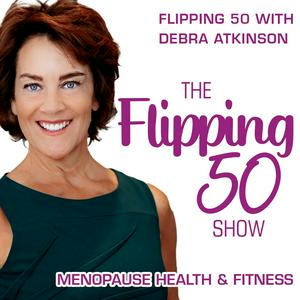This episode is sponsored by Fatty15, Sundays, and AirDoctor.
Fatty15 - Fatty15 is on a mission to optimize your C15 levels to help support your long-term health and wellness - especially as you age. You can get an additional 15% off their 90-day subscription Starter Kit by going to https://fatty15.com/FLIPPING50 and using code FLIPPING50 at checkout.
Sundays - Make the switch to Sundays. Go right now to https://sundaysfordogs.com/FLIPPING50 and get 50% off your first order. Or, you can use code FLIPPING50 at checkout.
AirDoctor - Head to https://AirDoctorPro.com and use promo code FLIPPING50 to get UP TO $300 off today! AirDoctor comes with a 30-day money back guarantee, plus a 3-year warranty—an $84 value, free!
Connect with Flipping 50:
Facebook Group - Flipping50 Insiders
Instagram - @Flipping50TV
YouTube - @Flipping50TV
More Episodes - Flipping 50 The Stronger Way
Other Episodes You Might Like:
Previous Episode - Cortisol and Cardio for Women Over 40: What Your Heart Needs Now
Next Episode - 6 Menopause Fitness Questions From the Community
More Like This:
How to Find a Positive Body Mindset While Menopause Changed Everything
The Perimenopause Brain Health Window with Mariza Snyder
Resources:
Join Flipping 50 Menopause Fitness Specialist® to become a coach! Get 50% off this month*. Includes GLP-1 Coaching Course + Longevity Fitness Course (valued at $1,000)
Get the Flipping 50 STRONGER 12-week program for your at-home safe, sane, simple exercises. Get 50% off this month*!
*Note: Discounts applicable this month – Feb 2026.
Many things in life can negatively impact mental and physical health more than you realize — and it may not be what you think.
We take a bold, honest look at fitness influencers, social media, and what that constant exposure to curated bodies, aesthetic-driven workouts, and “fitspiration” content is really doing to your confidence, your choices, and your results — especially in midlife and menopause.
From the rise of fitness influencers to the research showing two-thirds of top posts lack scientific backing, we unpack the difference between influence and expertise — and why it matters for your body, your hormones, and your long-term health.
Because what feels motivating in the moment may be the very thing that negatively impacts mental and physical health.
If this episode made you flip your workout routine — share it!
👉 Post to your stories, tag @Flipping50TV in Instagram and share the episode to your best friend.
👉 Meet other women, who are done with outdated fitness advice, at Flipping50 Facebook Group.
👉 Subscribe, share, and leave a review if you’re ready to flip the script on Flipping 50 The Stronger Way.


